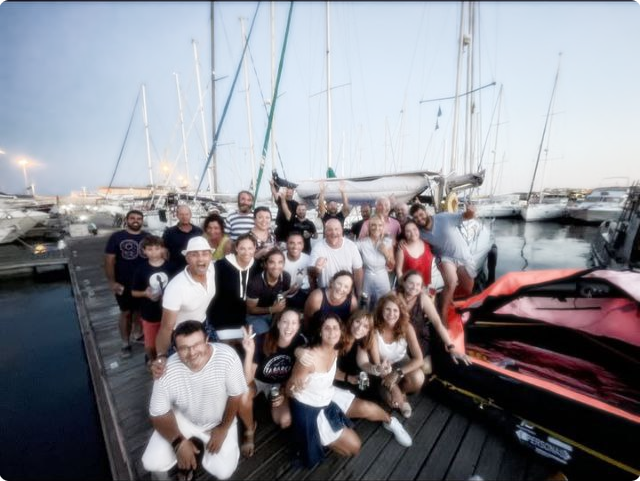
We spent almost two years moored in San Gabriel, a port in Alicante that stole our hearts—not only for its neighborhood and starry Mediterranean nights, but also for the pontooners, that makeshift family who welcomed us without asking questions.
We met them in our first days. Their weekend gatherings were legendary: music blasting with Miguel as the official DJ (and his speaker making the pontoon boards shake), raucous laughter, and the unmistakable smell of spilled beer and ham. At first, we resisted. “What a racket!” we thought, closing the hatches of the Azul to drown out the noise. But one night, Carlos and Ivana introduced us.
That’s how we met Laura and Antón, Manolo, Carmen, Eva, Manolo (yes, two Manolos), Evi, Miguel, and the others. People of the sea, weathered by sun and wind, with overflowing generosity. They adopted us without questions, inviting us every weekend to their ritual: sailing to "the pool"—a hidden cove near Cabo de Huertas—or spending the day at Tabarca.
Antón and Manolo were the most persistent: “Are you coming today? The water is like glass!” I always declined, caught up in endless work aboard or in the excuses my mind whispered. Now I think I should have accepted at least once to join them, to feel the salty breeze on our faces while laughing at silly things. But that’s life: sometimes we miss moments by looking too inward.
Then there was Xema, "El Xemita," our grumpy neighbor with a tender heart. A sea wolf we only saw at night, starting his engine with a serious expression. It took months to break through his tough exterior, but when we did, we found an unexpected ally. He was the one who helped us mend the torn genoa, guiding us with his rough hands and grandfatherly patience. “This needs to be sewn with sail thread, not those plastic things,” he’d mutter, while the midday sun burned our necks.
And how could we forget Pedro and his wife, two lovers of the sea who, though not professional fishermen, carried salt in their veins? That winter, Pedro brought back a giant tuna, so huge they had to use the KRAIK's halyard (Carlos and Ivana’s sailboat) to hoist it ashore. With his usual generosity, he shared it with everyone. That night, the pontoon turned into an impromptu feast: smoking grills, cold beers, and the sweet-sour tang of lemon on fresh meat. There were no speeches or plans, just the instinct to celebrate together, as it should always be.
Now, as we prepare the Azul to set sail, I look back and smile. San Gabriel is no longer just a port on the map: it’s the smell of salt mixed with Xema’s tobacco, the echo of Miguel playing “La Bamba” at 3 a.m., and the taste of that tuna which tasted like camaraderie. We’ll come back, I don’t know when, but we will. Because some places don’t stay in memory—they embed themselves in the soul.
Thank you, pontooners, for reminding us that home sometimes floats.
